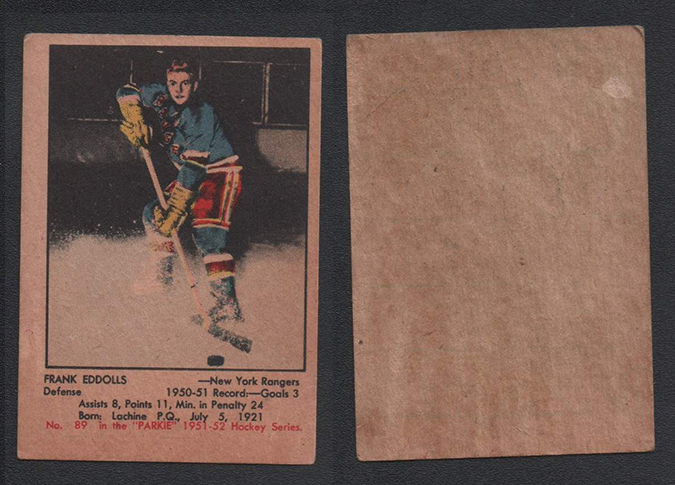Golikov and Jackson
Both are two-way 2nd line centers. Jackson boasts 2 top 10s (10, 10) in goals, 2 top 12s (5, 12) in assists, and 3 top 20s(9, 13, 19) in points in his career, although they came during the WWII days. Despite this, these statistical finishes are still impressive, and very significant. For example, in 40-41, he finished 10th in goals ahead of guys like Eddie Wiseman, Ray Getliffe, Mac Colville, Neil Colville, Nick Metz, Lorne Carr, Milt Schmidt, Sid Abel, and Mud Bruneteau. So certainly, he was ahead of some elite company here and wasn't playing against bums. Then take 43-44 when he was 10th in goals, 5th in assists, and 9th in points. He beat out Toe Blake, Ted Kennedy, Elmer Lach, and Gus Bodnar in goals; Bill Cowley, Babe Pratt, Gus Bodnar, Doug Bentley, Bill Mosienko, Lorne Carr, Syd Howe, Dit Clapper, and Earl Seibert in assists; and Gus Bodnar, Toe Blake, Maurice Richard, Ray Getliffe, Mud Bruneteau, and Ted Kennedy in points, just to name a few. The misconception that Art Jackson beat a bunch of bums for his impressive finishes is completely false, as you can see he beat out some tremendous competition. I'm not sure how I can come up with a fair comparison of Golikov and Jackson because they played in very different times in different leagues, so I'll league Jackson's finishes to speak for themselves.
Yevgeny Mishakov and Nick Libbett
Both are touted as being strong two-way wingers, with Mishakov being credited as being more physical. But when one takes a closer look at Libett's +/-, you will see some ugly, ugly numbers. I don't consider +/- to be the end all be all of judging a player, but when he is a career -167(regular and adjusted), one can't help but think that he must not have been as good in his own zone as indicated. He was a -41 in 74-75, the worst on the Red Wings. Now, the Red Wings were a bad team back then, but it's not like they were the worst in the league. Despite this, his +/- is awful. Libett has no top 10 finishes either, with his highest point finish being 45th in 71-72. Mishakov was touted as being a pretty similar player, while bringing an intensity and physical element to the table. Here are Mishakov's stats in comparison to Golikov's: Mishakov-183 goals in 400 games for .458/game in the Soviet league and 48 goals in 90 games internationally, good for .527/game, good for 20th all-time in Soviet international hockey history. Golikov had 172 goals in 435 games in the Soviet league, good for .395 goals/game, and 54 international goals in 129 games, good for .419 goals/game. As these stats illustrate, in both the Soviet league and internationally, Mishakov was a more prolific goal scorer, despite playing on a checking line. He also boasts a peak of 29 goals in 35 games internationally between 1968 and 1972. Mishakov brings a goal scoring, physical, tough, and two-way element to my line. I'll let Mishakov's superior numbers and Libett's +/- do the talking.
Oksanen vs. Dahlen
-This is going to be a very difficult comparison because there is no real basis of comparison, and being able to gauge the level of Finnish hockey in the 1960s compared to the 1990s is basically impossible. So, I'll discuss the roles of each. Dahlen's is pretty obvious, he's the crease, front of the net presence on this line, but his highest point finish was 57th in 93-94. Oksanen will serve as the shooter, trigger guy on our line. Mishakov will open up space for Jackson to pass to Oksanen in the slot. For their intended purpose on their lines, both serve their purpose well. Both 2nd lines are very responsible defensively, and are good in their own zone, but Jackson's finishes and Mishakov's impressive goal stats stick out most.





 so don't you try and imply he can't handle top line role player duties at the AAA level. he's playing here with two other top liners in Barlow, three-time Stanley Cup hero, and Shepelev, two-time Canada Cup hero and 5-year great play for the Soviet national team against the world's best. This line rocks.
so don't you try and imply he can't handle top line role player duties at the AAA level. he's playing here with two other top liners in Barlow, three-time Stanley Cup hero, and Shepelev, two-time Canada Cup hero and 5-year great play for the Soviet national team against the world's best. This line rocks.  It should be obvious. The team has weaknesses, but not on the first line, no way.
It should be obvious. The team has weaknesses, but not on the first line, no way.